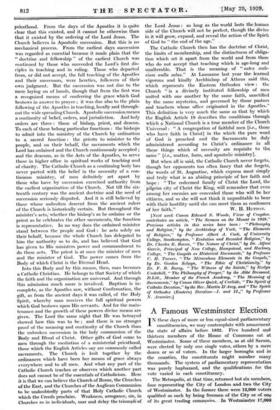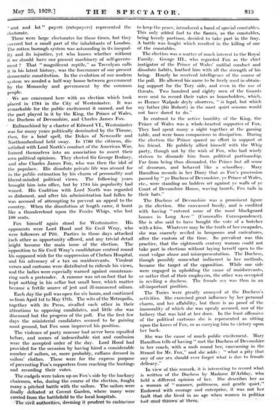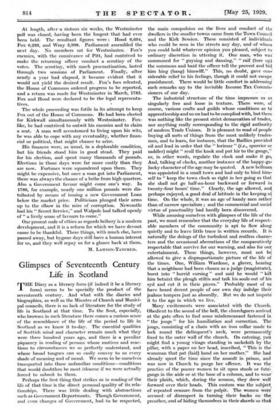A Famous Westminster Election'
IN these days of more or less equal-sized .parliamentary constituencies, we may contemplate with amazement the state of affairs before 1832. Five hundred and thirteen members of the House of Commons sat at Westminster. Some of these members, as at old Sarum, were elected by only one single voter, others by a mere dozen or so of voters. In the larger boroughs and in the counties, the constituents might number many thousands. The system of parliamentary representation was purely haphazard, and the qualifications for the vote varied in each constituency..
The Metropolis, at that time, returned but six members, four representing the City of London and two the City of Westminster. In the former there were 12,000 voters qualified as such by being freemen of the City or of one Of its great trading companies. In Westminster 17,000 "scot and lot payers (ratepayers) represented the electorate. • - - • • ... . .
These were large electorates for those times, but they covered but a small part of the inhabitants of London. The rotten.borough system was astounding in its inequal- ity and its injustice, yet who knows whether without it we_should have our present machinery of self-govern- ment ?- That " magnificent reptile," as Trevelyan calls it in his latest history,- was the forerunner of our present democratic constitution. In the evolution of our modern system we needed a half-way house between government by the Monarchy and government by the common people.
• We _are concerned here with an election which took placed in -17'84 in the City of Westminster. It was remarkable for the public' excitement it caused, and for the part played 'in it by the King, the Prince Of Wales, the Duchess of Devonshire, and Charles James Fox.
-Enfranchised by a charter of Edward VI.; Westminster was for many years politically dominated by the Throne, then, for a brief spell, the Dukes of Newcastle and Northumberland held sway. In 1780 the citizens,- dis- satisfied with LOrd North'S conduct of the American War, formed thernselves into an 'association to assert their Own political opinions. They elected Sir George Rodney, and also Charles James Fox, who was then the idol of the populace. His dissolute private life was atoned for in the public estimation by his charm of personality and liberal-minded political views. The following years brought him into office, but by 1784 his popularity had waned. His Coalition with Lord North was regarded as dishonest, and after his administration had fallen he was accused of attempting to prevent an appeal to the country. When the dissolution at length came, it burst like a thundercloud upon the Foxite Whigs, who lost 160 seats.
Fox himself again stood for Westminster. His opponents were Lord Hood and Sir Cecil Wray, who Were followers of Pitt. Parties in those days attacked each other as opportunity offered, and any trivial detail might become the main issue of the election. The opposition to Sir Cecil Wray's candidature centred round his supposed wish for the suppression of Chelsea Hospital, and his advocacy of a tax on maidservants: Virulent verses and cartoons were distributed to ridicule his views, and the ladies were especially warned against countenan- cing such a pretender. A rumour was set on foot that he kept nothing in his cellar but small beer, which matter became a fertile source of jest and ill-mannered odium.
Each day the poll was open for six hours, and continued so froth April 1st to May 17th. The wits of the Metropolis, together with its Press, rivalled each other in their attentions to opposing candidates, and little else was discussed but the progress of the poll. For the first few days the ministerial candidates seemed to be gaining most ground, but Fox soon improved his position.
The violence of party rancour had never been equalled before, and scenes of indescribable riot and confusion were the accepted order of the day. Lord Hood had provided for the occasion by having hired a considerable number or sailors, or, more probably, ruffians dressed in Sailors' clothes. These were for the express purpose of preventing Fox's supporters from reaching the hustings and recording their votes.
• The cudgels were taken up on Fox's side by the hackney chairmen, who, during the course of the election;-fought many a pitched battle with the sailors. The sailors were frnally defeated at Covent 'Garden, where 'many were carried from the battlefield to the local hospitals.
The *civil Authorities, deeMing it prudent -to endertVour to keep the peace, introduced a band of special constables. This only added fuel to the flame's, as the constables, being keenly partisan, decided to take part in the fray. A battle was fought which resulted in the killing of one of the constables.
The election was a matter of much interest to the Royal Family. George III., who regarded Fox as the chief instigator of the Prince of Wales' unfilial conduct and dissolute habits, loathed him with all the strength of his being. Hourly he received intelligence of the course of the poll. He allowed his name to be freely used in obtain- ing support for the Tory side, and even in the use of threats. Two hundred and eighty men of the Guards were sent to record their votes as householders, which, as Horace Walpole dryly observes, " ps legal, but which my father (Sir Robert) in the most quiet seasons would not have dared to do."
In contrast to the active hostility of the King, the -Prince .6f Wales- was a whole-hearted supporter of Fox. They had spent many a night together at the gaming • table, and. were boon 'companions in dissipation. During the election the Prince spared no effort in support of his friend. He publicly allied himself with the Whig party, though not by the wish of Fox, who had wisely . striven 'to dissuade him from political partisanship. Far froth being thus dissuaded, the Prince loSt all sense of decorum, and behaved like a schoolboy. Mary Hamilton records in her Diary that as Fox's procession passed by " ye Duchess of Devonshire, ye Prince of Wales, etc., were standing on ladders set against ye walls of ye Court of Devonshire House, waving laurels, Fox tails in their hats." .
The DuchesS of Devonshire was a prominent figure in the election. She canvassed busily, and is credited with having " entered some of the most blackguard houses in Long Acre " (Cornwallis Correspondence). She is also said to have bought the vote of a butcher with a kiss. Whatever may be the truth of her escapades, she was coarsely reviled in laMpoons and caricatures, after the custom of the time. So prevalent was this practice, that the eighteenth century woman could not take part in elections without laying herself open to the Most vulgar abuse and misrepresentation. The Duchess, though possibly • somewhat indiscreet in her methods, became the target of the opposition. While one side were engaged in upholding the cause of maidservants, or rather that of their employers, the other was occupied in reviling a duchess. The female sex was thus in an all-important position.
The Tories were greatly annoyed at the Duchess's activities. She exercised great influence by her personal charm, and her. .affability, but there is no proof of the immorality of which she was openly accused, nor of the bribery that was laid at her door. In the least offensive of the political cartoons she is represented as sitting upon the knees of Fox, or as carrying him to victory upon her back.
She was the cause of much public excitement. Mary Hamilton tells'of having " met the Duchess of Devonshire in her coach; with a mob round her, canvassing in the, Strand for Mr. Fox," and she adds : " what a pity that any of our sex should ever forget what is due to female delicacy." • - 'In view of this remark, it is interesting to record what is written of the Duchess by Madame D'Arblay, who held a different opinion of her. She describes her as a woman of " manner, politeness, and gentle 'quiet." Endowed with courage and enterprise, it' was not her fault that she lived in an age when women in politics' had rtmd thitiwn• at' them: ' ' At length, after as riotous six weeks; the Westminster poll was closed; having been the longest that had • ever been held. The resultant figures were : Hood 6,694, Fox 6,288, and Wray 5,998. Parliament assembled the next day. No members sat for Westminster. - Fox's enemies, with the connivance of Pitt, had contrived to make the returning officer conduct a scrutiny of the votes. The scrutiny, • with much procrastination, lasted through two sessions of Parliament. Finally, after nearly a year had elapsed, it became evident that it would not yield the desired result. Fox's foes relented, the House of Commons ordered progress to be reported, and a return was made for Westminster in March, 1785. Fox and Hood were declared to be the legal representa- tives. • The whole proceeding was futile in its attempt to keep Fox out of the House of Commons. He had been elected for Kirkwall simultaneously with Westminster. Fox- like, he had contrived to outwit his enemies and to claim a seat. A man well accustomed to living upon his wits, he was able to cope with any eventuality, whether finan- cial or political, that might chance to arise.
His finances were, as usual, in a deplorable condition, but his friends stood him in good stead. They paid for- his election, and spent many thousands of pounds. Elections in those days were far more costly than they are now. Fortunes were squandered upon them. They might be expensive, but once a man got into Parliament, there was always the chance of a bribe from high quarters. Also a Government favour might come one's way. In 1780, for example, nearly one million pounds were dis- tributed by means of issuing a new Government Loan below the market price. Politicians plunged their arms up to the elbow in the mire of corruption. Newcastle had his " Secret Service," and Walpole had talked openly of " a lively sense of favours to come."
Our present code of ethics as regards bribery is a modern development, and it is a reform for which we have devout cause to be thankful. These things, with much else, have passed away, but bygone days still have a human interest for us, and they well repay us for a glance back at them.
M. LAWSON-TANCRED.










































 Previous page
Previous page